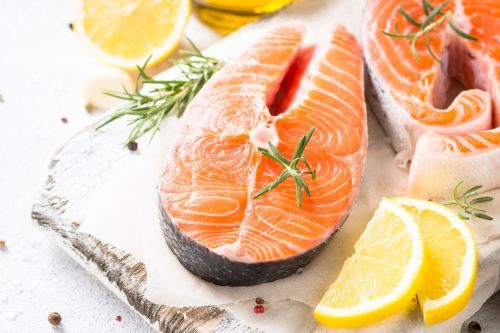Magazin
Lachsöl Vitamine
Lachsöl wird aus der Fischart Lachs gewonnen und ist überwiegend in Kapselform erhältlich, die sowohl in Apotheken, Drogerien und Reformhäusern als auch in Supermärkten und über den Internethandel verkauft wird. Wegen des starken Eigengeruchs füllt man das Lachsöl bevorzugt in Kapseln ab und verkauft es als Nahrungsergänzungsmittel. Die transparenten Kapseln mit ihrem goldgelb-orangefarbenen Inhalt werden unzerkaut geschluckt und lösen sich im Magen rasch auf, um ihre wertvollen Inhaltsstoffe freizusetzen. Mehr Info hier
Weitere nützliche Links:
Quellenangabe
American Heart Association: Fish and Omega-3 Fatty Acids, aufgerufen am 7.11.2018
K. Kuriki, K. Wakai, K. Hirose, K. Matsuo, H. Ito, T. Suzuki, T. Saito, Y. Kanemitsu, T. Hirai, T. Kato, M. Tatematsu, K. Tajima: Risk of colorectal cancer is linked to erythrocyte compositions of fatty acids as biomarkers for dietary intakes of fish, fat, and fatty acids. In: Cancer Epidemiol Biomarkers Prev. 15(10), Oct 2006, S. 1791–1798.
J. Shannon, I. B. King, R. Moshofsky, J. W. Lampe, D. L. Gao, R. M. Ray, D. B. Thomas: Erythrocyte fatty acids and breast cancer risk: a case-control study in Shanghai, China. In: Am J Clin Nutr. 85(4), Apr 2007, S. 1090–1097.
K. Kuriki, K. Hirose, K. Wakai, K. Matsuo, H. Ito, T. Suzuki, A. Hiraki, T. Saito, H. Iwata, M. Tatematsu, K. Tajima: Breast cancer risk and erythrocyte compositions of n-3 highly unsaturated fatty acids in Japanese. In: Int J Cancer.121(2), 15. Jul 2007, S. 377–385.
P. D. Terry, J. B. Terry, T. E. Rohan: Long-chain (n-3) fatty acid intake and risk of cancers of the breast and the prostate: recent epidemiological studies, biological mechanisms, and directions for future research. In: J Nutr. 134(12 Suppl), Dez 2004, S. 3412S-3420S.
D. Yan, Q. Yang, M. Shi, L. Zhong, C. Wu, T. Meng, H. Yin, J. Zhou: Polyunsaturated fatty acids promote the expansion of myeloid-derived suppressor cells by activating the JAK/STAT3 pathway. In: Eur J Immunol. 30. Jul 2013. doi:10.1002/eji.201343472. PMID 23897117.
P. C. Calder: n-3 polyunsaturated fatty acids, inflammation, and inflammatory diseases. In: Am J Clin Nutr. 83(6 Suppl), Jun 2006, S. 1505S-1519S.
Yiqing Yan, Wei Jiang u. a.: Omega-3 Fatty Acids Prevent Inflammation and Metabolic Disorder through Inhibition of NLRP3 Inflammasome Activation. In: Immunity. 38, 2013, S. 1154–1163, doi:10.1016/j.immuni.2013.05.015.
M. P. Freeman, J. R. Hibbeln, K. L. Wisner u. a.: Omega-3 fatty acids: evidence basis for treatment and future research in psychiatry. In: J Clin Psychiatry. 2006, S. 1954–1967.
H. Iso, S. Sato, U. Umemura, M. Kudo, K. Koike, A. Kitamura, H. Imano, T. Okamura, Y. Naito, T. Shimamoto: Linoleic acid, other fatty acids, and the risk of stroke. In: Stroke. 33, 2002, S. 2086–2093.
M. C. Morris, D. A. Evans, C. C. Tangney, J. L. Bienias, R. S. Wilson: Fish consumption and cognitive decline with age in a large community study. In: Arch Neurol. 62(12), Dez 2005, S. 1849–1853.
B. Heude, P. Ducimetière, C. Berr; EVA Study: Cognitive decline and fatty acid composition of erythrocyte membranes–The EVA Study. In: Am J Clin Nutr. 77(4), Apr 2003, S. 803–808.

